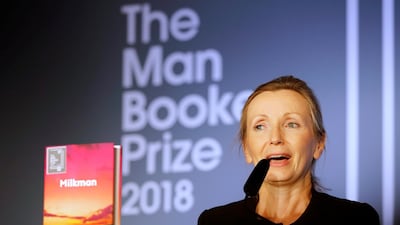Irish writer Anna Burns's novel Milkman, her third and the winner of this year's prestigious Booker Prize, is an agonising, Kafkaesque journey through a tangled psychological labyrinth led by the story's narrator, an unnamed 18-year-old woman living, presumably, in 1970s Belfast.
The city isn’t mentioned by name, in fact, no character, location or political party is named. The narrator refers to herself as “middle sister” and “maybe-girl friend”, and the United Kingdom loyalists as those “across the water” or “across the street”. However, via the context and references, Burns – who is from Belfast – leaves no doubt that we’re in Northern Ireland, when animosity and bloodshed between Catholics and Protestants were endemic and polarising, infecting every pore of daily life.
The protagonist is Catholic, and her tormentors come largely from her own kind, even her own family. The absence of names and dates serve to make Milkman's themes and threads all the more universal, applicable to other places and people forced to survive in countries where tyranny and fear, not law and justice, rule the day. Burns's ability to pull this off, and her protagonist's haunting stream-of-consciousness voice, catapults her into the league of some of our great modern political novelists, such as Gabriel Garcia Marquez, Milan Kundera, and Nadine Gordimer.
The plot revolves around the young woman’s encounter with a high-ranking militant, presumably from the IRA, known simply as “milkman” or “the milkman”. The early forties operative stalks her, usually in a “shapeless” white van, coaxing her to let him transport her to her destination. He knows all about her life, family, and routines, in detail, which understandably scares and shakes her. Moreover, his intentions towards her are opaque. Are they sexual, or is there something else there? Do the “renouncers of the state,” as she calls them, have something more in mind for her in their unscrupulous battle to the death with the occupiers? This is the last thing middle sister wants. In fact, she has spent her life trying to duck the brutal politics of the no-holds-barred standoff. She has witnessed tragedy again and again, from close quarters.
Once sucked into its fierce slipstream, death is the inevitable end, be it sooner or later, as was the fate of two of her brothers, a brother in law, and numerous others in her life, mostly the victims of the renouncers’ convoluted self-justice in their style: car bombings, slit throats, a bullet in the head.
In the context of such extreme paranoia and distrust, just about anything that anyone says can be misconstrued, using the warped logic of the circumstances, to incriminate them as disloyal to the cause. There’s no aspect of life that is beyond reach of the second-guessing.
Middle sister, for example, has a love interest, whom she calls “maybe-boyfriend”, since the exact seriousness of the relationship in unclear. He’s an unpolitical car mechanic. By a matter of happenstance, he and his garage mates wind up owners of a smashed-up Bentley Blower, a 1920s-era racing car produced in the UK, and he takes home the coveted supercharger.
The neighbour lads drop by his house to admire it, oohing and ahhing until one envious voice stops the party dead by asking who went home with the auto part that had “the flag” on it. Bentleys are trademark English and stamped with the Union Jack. (In middle sister’s locality, it is even suspect to watch James Bond movies, much less to admit to liking them.) Even though maybe-boyfriend didn’t take home the UK insignia, the trouble maker asks whether he would have.
In the stalking or recruiting or harassment of middle sister, the milkman brings up the Bentley supercharger, and in these times that’s enough for a bomb to find its way under maybe-boyfriend’s car, should she not drop him as milkman instructs her to. So this matter then enters the relationship of middle sister and maybe-boyfriend, though unspoken, only hinted at and implied. In this community, nobody ever says what they really mean.
The rumours the community hatches about middle sister’s affair with the married, militant milkman upends her life and her relationships. Finally, defeated, she gives in and accepts a ride from milkman. She regrets it immediately.
Initially, as I read Milkman, spellbound by Burns's artful prose and the fate of middle sister and her family, I thought of the dissident writers of Eastern Europe during the Cold War, such as Kundera but also Christa Wolf, Gyorgy Konrad and Vaclav Havel. Middle sister refers to her community as a "totalitarian enclave", and indeed those who survived the worst of Soviet communism can certainly relate to the plights of Burns's characters in Milkman. But the further I read, the more I realised that the twisted logic of today's ever more illiberal societies in the West – and the totalitarian systems elsewhere in the world – are equally relevant. The severe world of milkman is not where we want to go – and Burns's brilliant novel is, in part, a poignant cautionary tale, illustrating why.


